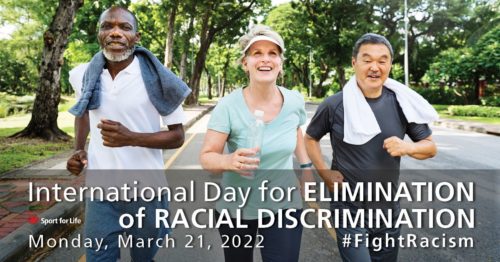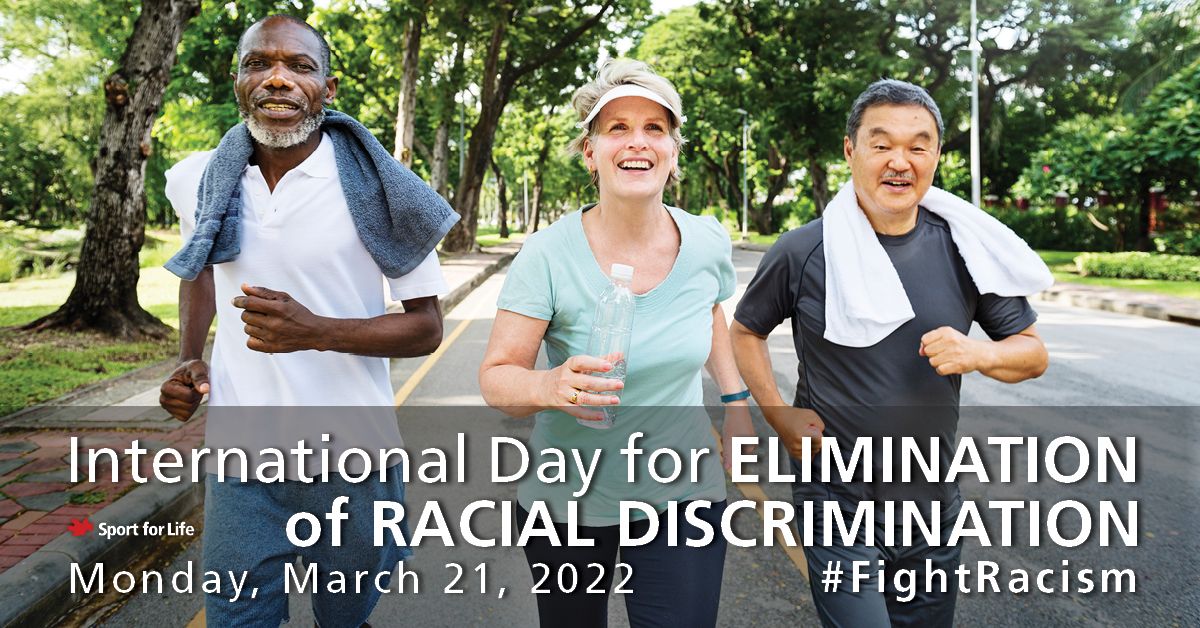Sport for Life recognizes the International Day for the Elimination of Racial Discrimination
 Canada may pride itself on being one of the most racially diverse countries in the world, but racism continues to impact the lives of its residents on a daily basis.
Canada may pride itself on being one of the most racially diverse countries in the world, but racism continues to impact the lives of its residents on a daily basis.
That racism exists within the sport system, unfortunately, whether it involves a coach using a derogatory epithet, a team having an insensitively racialized mascot, or a systemic issue that excludes certain groups from being able to meaningfully engage with the sport.
To celebrate the International Day for the Elimination of Racial Discrimination, first founded in South Africa following the evils of apartheid, Sport for Life would like to share some insights from our staff team about how breaking down the barriers that divide us and sharing cultural knowledge is the only way forward. Together, we need to #FightRacism.
Racism needs to go
Johnadeen Albertini first came to Canada from St. Lucia in 1994, settling in Kingston, Ontario with his family. Now working as Sport for Life’s Senior Coordinator of Communications, he has insights from growing up in a predominantly white neighborhood that will inform how he supports the organization in pursuing equity, diversity, inclusion and accessibility.
“I did experience some racism growing up in Kingston. I remember being the only Black family for blocks and blocks, and I remember the neighbours asking us if my mom was on welfare, even though my brother and I kept telling them no,” he said.
These experiences took a toll, but didn’t define his upbringing. He feels fortunate to be Canadian.
“Even though we experienced racism, I still believe in Canada. As a whole, a lot has improved and I think our country’s more open than ever. I think when it comes to being inclusive, when it comes to welcoming newcomers and welcoming people from different nations and backgrounds, I think we’re going a great job.”
But that doesn’t mean he thinks it’s time to be complacent.
“As an Afro Canadian, I think that racism is something that we should acknowledge, which means discussing it with other people and discussing what we can do to fight against it. I think deep down Canadians as a whole have strong values of integrity and inclusion, and help those in need, and make people feel like they belong,” he said.
“That’s why I like living in Canada, and that’s why I think we need to do more to uphold those values. We need to make a strong stand against racism and say together that yes, it is wrong. Racism needs to go.”
Closing the communication gap
Khalil Ur Rehman understands that racism is often motivated by fear and misunderstanding, which is why communication is such a key part of fighting it. As Sport for Life’s Senior Coordinator of Finance and coming from Pakistan, he’s part of a team that is working to eradicate all forms of racial prejudice in the Canadian sport system and elsewhere.
“Sometimes the sense of fear about other people of a different culture could be minimized if we could minimize the communication gap. Some people used to believe in baseless stereotypes about other nations or people of another colour, so we need to improve our knowledge of other cultures and develop the knowledge of how to accommodate various types of people,” he said.
“By sharing resources, love, and respect; peace and dignity will never be reduced. So we need to develop further awareness among all different communities, where we are living. By improving our connection with different people without forcing a particular way of life, we could definitely improve our environment. Canada is a beautiful country and the level of racism here is low compared to other countries.”
Why don’t you look like your parents?
As Manager of People and Culture at Sport for Life, Billie Tes is passionate about creating a more inclusive future for all Canadians, which means breaking down the barriers that come from racism and ignorance. She was born in Canada, and has an ancestry of Afro-Caribbean from Barbados and European from Ireland, Scotland and England.
“As a person who is multiracial, I can recall many instances where I encountered familiar questions like ‘where are you from?’ and ‘why don’t you look like your parents?’ Unfortunately, these questions are not uncommon. It’s important to recognize that these questions can have a big impact,” she said.
“Questions like these can destabilize your self-identity and make you question who you are. Furthermore, the project of people being racialized does not occur in a contained vortex. Instead, the outcomes are dangerous actions towards people such as: systemic racism/institutional racism, underrepresentation and colonization.”
She’s allowed her lived experiences of racism to motivate her work.
“As I reflect back on the many encounters I have had, these questions have provided me with opportunities for strength and resilience within my pathway of identity formation, while they have also been unfair and unjust,” she said.
“Think about why you ask certain questions. Think about why questions can have a big impact on us. Sometimes they can be innocent and other times they can feel like microaggressions. I’ll leave you with a story: in primary school a schoolmate asked me “if my parents are black and white, why am I not gray?”
To learn more, visit the United Nations website.

